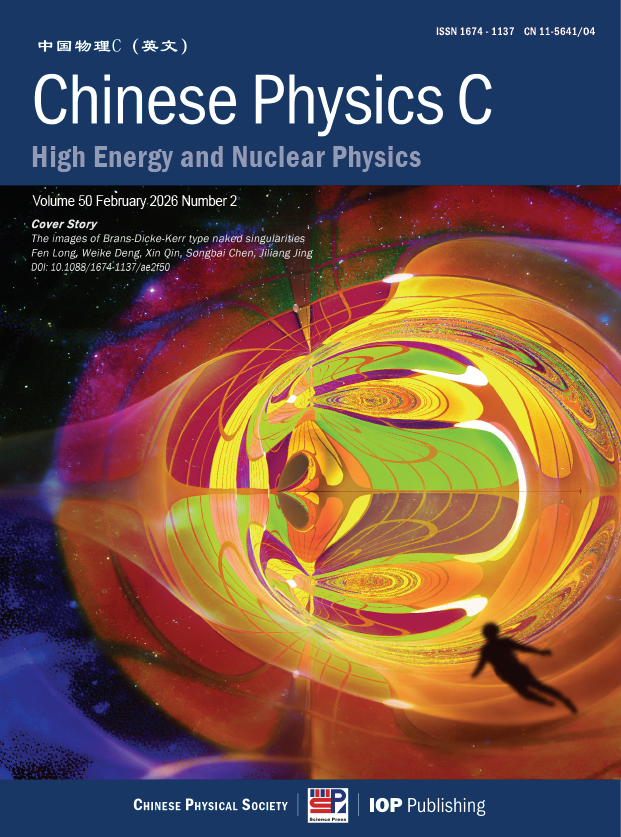2009 Vol. 33, No. 2
Display Method: |
Questions about detecting the CP-violating decay process of J/ψ→K0K0→KSKS are discussed. Possible background and material regeneration effects are analyzed. The discussion can be directly extended to other vector quarkonium
decays, like Υ, ψ(2S) and φ→KSKS.
Based on calculating the contributions of the littlest Higgs model with T-parity (called LHT model) to the anomalous top coupling tqγ (q=u or c), we consider single top production via the t-channel partonic process eq→et in ep collisions. Our numerical results show that the production cross section in the LHT model can be significantly enhanced relative to that in the standard model (SM).
We present a short and direct derivation of Hawking radiation by using the Damour-Ruffini method, as taking into account the self-gravitational interaction from the Kerr black hole. It is found that the radiation is not exactly thermal, and because the derivation obeys conservation laws, the non-thermal Hawking radiation can carry information from the black hole. So it can be used to explain the black hole information paradox, and the process satisfies unitary.
The analytic expression of proton in deep inelastic scattering is studied by using the color glass condensate model and the dipole picture. We get a better description of the HERA DIS data than the GBW model which was inspired by the Glauber model. We find that our model satisfies the unitarity limit and Froissart
Bound which refers to an energy dependence of the total cross-section rising no more rapidly than ln2 s.
Two-dimensional total routhian surface (TRS) calculations are carried out to determine the triaxial superdeformation (TSD) of the even-even nucleus 174W, and the result indicates that TSD state exists with deformation parameters ε2=0.42 and γ=34.7°. In the same way, the total routhian surfaces for the nuclei 172,176W are also calculated. It shows that the neutron shell correction energy plays a key role in the formation of TSD nuclei 172,174,176W, while the high j intruder orbitals and rotational energy are also crucial in the formation mechanism.
Total-Routhian-Surface calculations have been performed to investigate the deformation and alignment properties of the No isotopes. It is found that normal deformed and superdeformed states in these nuclei can coexist at low excitation energies. In neutron-deficient No isotopes, the superdeformed shapes can even
become the ground states. Moreover, we plotted the kinematic moments
of inertia of the No isotopes, which follow very nicely available experimental data. It is noted that, as the rotational frequency increases, alignments develop at hω=0.2-0.3MeV. Our calculations show that the occupation of the νj15/2 orbital plays an important role in the alignments of the No isotopes.
In this paper Micromegas has been designed to detect neutrons. The simulation of the spatial resolution of Micromegas as neutron detector is carried out by GEANT4 toolkit. The neutron track reconstruction method based on the time coincidence technology is employed in the present work. The influence of the flux of incident 14 MeV neutron and high gamma background on the spatial resolution is carefully studied. Our results show that the spatial resolution of the detector is sensitive to the neutron flux, but insensitive to the intensity of γ background if the neutron track reconstruction method proposed by our group is used. The γ insensitivity makes it possible for us to use the Micromegas detector under condition which has high γ-rays background.
Multi-gap Resistive Plate Chamber (MRPC) is a new generation of gas detector with good timing and spacial resolution, whose technique is widely applied in some recent high energy (nuclear) physics experiments. In this letter, we report a long-strip two-end readout MRPC and its test beam performance. The measurements show that the long-strip performs a transmission line characteristic and the impedance is independent of the length of strip. The MRPC module we developed is presented to gain a timing resolution of ~80 ps
and a spacial resolution of ~6.4 mm. The possible application of the MRPC is also discussed.
A new kind (two end readout) of Multi-gap Resistive Plate Chamber with long readout-strip (LMRPC) is developed to be used at the large-area Muon Telescope Detector (MTD) at mid-rapidity at RHIC/STAR experiment for Time-of-Flight (TOF) measurement. The LMRPC has an active area of 87 cm×17 cm, 10 gas gaps of 250 μm arranged in 2 stacks, with readout strips of 2.5 cm wide and 90 cm long. The considerations in LMRPC design related to its performance are discussed in this paper. The cosmic ray test results of a prototype LMRPC show a detection efficiency >95% and the time resolution ~70 ps.
Design and construction of the first prototype ionization chamber for CSNS and Proton Accelerator (PA) beam loss monitor (BLM) system is reported. The low leakage current (<0.1 pA), good plateau (≈800 V) and linearity range up to 200 Roentgen/h are obtained in the first prototype. All of these give us good experience for further improving the ionization chamber construction.
In this paper, we present a rule to improve the nonlinear solution with frequency map analysis (FMA), and without frequently revisiting the optimization algorithm. Two aspects of FMA are emphasized. The first one is the tune shift with amplitude, which can be used to improve the solution of harmonic sextupoles, and thus obtain a large dynamic aperture. The second one is the tune diffusion rate, which can be used to select a quiet tune. Application of these ideas is carried out in the storage ring of the Shanghai Synchrotron Radiation Facility (SSRF), and the detailed processes, as well as better solutions, are presented in this paper. Discussions about the nonlinear behaviors of off-momentum particles are also presented.
In this paper we treat first some nonlinear beam dynamics problems in storage rings, such as beam dynamic apertures due to magnetic multipoles, wiggles, beam-beam effects, nonlinear space charge effect, and then nonlinear electron cloud effect combined with beam-beam and space charge effects, analytically. This analytical treatment is applied to BEPCⅡ. The corresponding analytical
expressions developed in this paper are useful both in understanding the physics behind these problems and also in making practical quick hand estimations.
Details of the active ways to suppress Closed Orbit Distortion (COD), including bending magnet sorting and survey and alignment of the magnets, are discussed based on the studies of affections to the COD by the bending magnet field error and the misalignment of quadrupoles. The closed orbit correction and the Slow Orbit Feed Back (SOFB) system for the SSRF storage ring are presented in this paper. With these available methods, better results were obtained during the commissioning period with 3 GeV beam energy.
Up to now, clinical trials of heavy-ion radiotherapy for superficially placed tumors have been carried out for six times and over 60 selected patients have been treated with 80—100 MeV/u carbon ions supplied by the Heavy Ion Research Facility in Lanzhou (HIRFL) at the Institute of Modern Physics, Chinese Academy of Sciences since November, 2006. A passive irradiation system and a dose optimization method for radiotherapy with carbon-ion beams have been developed. Experimental verification of longitudinally therapeutic dose distributions was conducted under the condition of simulating patient treatment in the therapy terminal at HIRFL. The measured depth-dose distributions basically coincide with the expected ones. These results indicate that the irradiation system and the dose optimization method are effective in the ongoing carbon-ion radiotherapy for shallow-seated tumors at HIRFL.
Positron annihilation lifetime and Doppler broadening of annihilation line techniques have been used to obtain information about the small pore structure and size of porous SiO2 thin film produced by sputtered Al-Si thin film and etched Al-Si thin film. The film is prepared by an Al/Si 75:25 at.-% (Al75Si25) target with the radiofrequency (RF) power of 66 W at room temperature. A 5 wt.-% phosphoric acid solution is used to etch the Al cylinders. All the Al cylinders dissolved in the solution after 15 h at room temperature, and the sample is subsequently rinsed in pure water. In this way, the porous SiO2 on the Si substrate is produced. From our results, the values of all lifetime components in the spectra of Al-Si thin film are less than 1 ns, but the value of one of the lifetime components in the spectra of porous SiO2 thin film is τ=7.80 ns. With these values of lifetime, RTE (Rectangular Pore Extension) model has been used to analyze the pore size.
ISSN 1674-1137 CN 11-5641/O4
Original research articles, Ietters and reviews Covering theory and experiments in the fieids of
- Particle physics
- Nuclear physics
- Particle and nuclear astrophysics
- Cosmology
- A SCOAP3 participating journal - free Open Access publication for qualifying articles
- Average 24 days to first decision
- Fast-track publication for selected articles
- Subscriptions at over 3000 institutions worldwide
- Free English editing on all accepted articles
- CPC Announces 2025 Outstanding Reviewers
- Chinese Physics C Outstanding Reviewer Award 2023
- Impact factor of Chinese Physics C is 3.6 in 2022
- 2022 CPC Outstanding Reviewer Awards
- The 2023 Chinese New Year-Office closure
- Cover Story (Issue 2, 2026) |The images of Brans-Dicke-Kerr type naked singularities
- Cover Story (Issue 1, 2026) A focused review of quintom cosmology: from quintom dark energy to quintom bounce
- Cover Story (Issue 11, 2025) The Earth-Magnet Assists DAMPE in Studying Cosmic Anti-Electrons
- Cover Story (Issue 9, 2025): Precise measurement of Ïc0 resonance parameters and branching fractions of Ïc0,c2âÏï¼Ïï¼/ K+K-
- Cover Story (Issue 8, 2025) A Novel Perspective on Spacetime Perturbations: Bridging Riemannian and Teleparallel Frameworks












